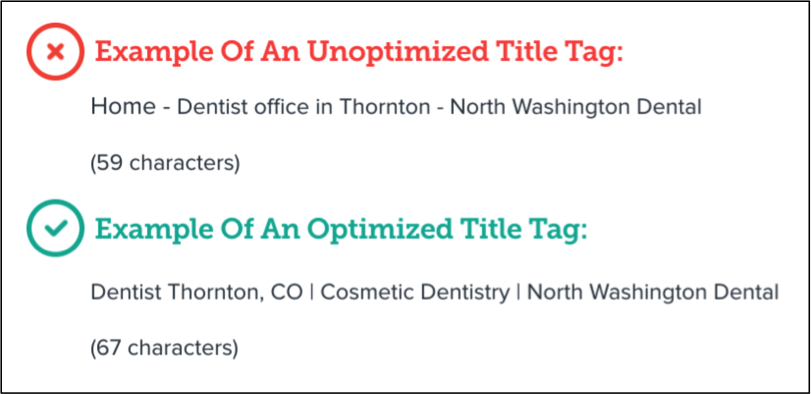Title tags are an extremely important aspect of SEO (Search Engine Optimization), affecting both search engines and users.
What Is A Title Tag?
To answer this question, first we must discuss where is a title tag.
When you type any kind of search into Google, you will receive organic listings on search results pages. Each of those listings has three components – a line of clickable blue text at the top, a green URL beneath that, and some gray text at the bottom. The blue text is the title, created by the title tag used in the HTML that makes up the page to which the search result leads.

Once you click on the listing and enter the website page, if you hover your mouse over the tab representing the site page, the title will also pop up.

At its most basic, a title tag’s purpose is to tell search engines and users what a webpage is about through the title that gets displayed. Think of the textbooks you used to study in school. The textbook as a whole is like your website, the chapters are the different pages on your website, and the chapter titles are your title tags – that which tells people what each section in the book is about up front without you having to read through the entire thing to figure it out.
Title Tags & Users
Title tags help people decide whether or not they want to visit that page of your site. As such, title tags should include keywords that illustrate the subject of the page clearly, and be accurate representations of the page’s content. You don’t want to have a title tag talking about purses that directs users to a shoes page. If users click on that listing in the search results because they are searching for purses, they will be disappointed to arrive on a shoes page and leave quickly – affecting your SEO traffic and page authority.
Title Tags & Search Engines
Just like users, search engines read title tags to determine what a webpage is about, and thus decide where to put it in the search results. Therefore, it is important that you get the page’s most important keywords in the title tag. Also, make sure the keywords you’ve selected accurately reflect the content of your page. Search engines are smart and are able to ascertain when title tags are being crafted to truthfully represent page content.
Best SEO Title Tag Practices
Length
Title tags should not be more than 70 characters with spaces. If they go over that, they will be truncated with ellipses in the search results and will look incomplete.

Keywords
A webpage’s most important keywords should be used in the title tag with the most important keywords coming first. Search engines read like we do – from left to right. So put your page’s most important keywords first and your least important keywords last. (Unless of course you are working in a language that reads right to left, then reverse this advice.)
Formatting
Title tags are not written to be grammatically correct or to sound like complete sentences. Capitalize the first letter of every word (including prepositions) and leave out any words that would make the title tags seem like complete sentences. Also, use dividers or pipes | to separate different keywords or keyword phrases. Do not use underscores, dashes, or any other extra punctuation unless your keyword is specifically written that way.

Relevant & Unique
Again, make sure that the title tag is an honest representation of the webpage’s content. And be sure that each title tag for every page on your site is unique. Do not use the same title tag for different pages.
Company Name
Many businesses want to put their company names at the front of title tags. This is not advised; especially if the company name is not the most important keyword you are trying to feature. If your company name is not the most significant keyword for a webpage, put it at the end of your title tag. Some people even advise leaving it out entirely for SEO, but for brand purposes you might want to include it now and then. This is a case-by-case scenario.
Getting Started
Title tags tell users and search engines exactly what a webpage is about. So format properly with best SEO practices, focus on using the right keywords, and make sure to get your point across. Each title tag is an opportunity to help your site pages rank higher and show up where you want them to in the search result pages. Don’t waste a single one!







Responses